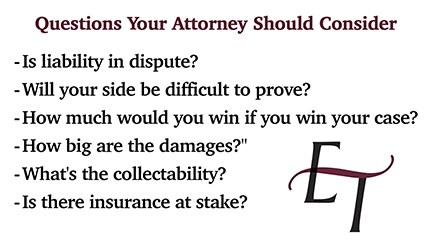“How much are attorneys fees in a personal injury case?” is a great question. Most attorneys will charge on a contingency basis, meaning it doesn’t cost you anything upfront; instead, attorney’s fees are paid after the case has been resolved.
Learn more about our Sacramento Personal Injury Attorney Services.
The instinct is to ask your attorney upfront: “How much are your fees going to be?” or “What percentage are you going to charge?” You should be prepared for the attorney to pause before they answer the question because they need more information. Attorneys who charge on a contingency basis are taking on a risk. It’s not guaranteed that they’re going to get paid. So, to take on that risk, they need to know more about your case. Here are some common questions your prospective attorney should consider before giving a monetary estimate.
 An attorney must know all that information to analyze the risk and quote you a fee properly. Once an attorney has mentioned a payment, you should appreciate and understand that that fee is negotiable. It’s not set by statute as a general rule; it’s not set by law. You can negotiate that fee percentage with the attorney, but here’s what’s important to remember about negotiating:
An attorney must know all that information to analyze the risk and quote you a fee properly. Once an attorney has mentioned a payment, you should appreciate and understand that that fee is negotiable. It’s not set by statute as a general rule; it’s not set by law. You can negotiate that fee percentage with the attorney, but here’s what’s important to remember about negotiating:
Attorneys should be quoting you a fair fee to begin with. If an attorney is willing to negotiate that fee to a lower amount, be concerned that that’s the same lawyer willing to negotiate your case to a lower amount and not make sure you get paid what’s fair. So, an attorney who stands firm by their fee will stand firm by the value of your case.
An essential aspect of the injury attorney fee is that it’s in writing, and you understand the contract thoroughly. At the end of the meeting, do you have a written fee agreement with the attorney that spells out the fee?
Our fee agreements are very short, concise, and in writing, and they are given to you at the end of the meeting. You’ll have a contract and know exactly what your fees will be and how they will be calculated.
